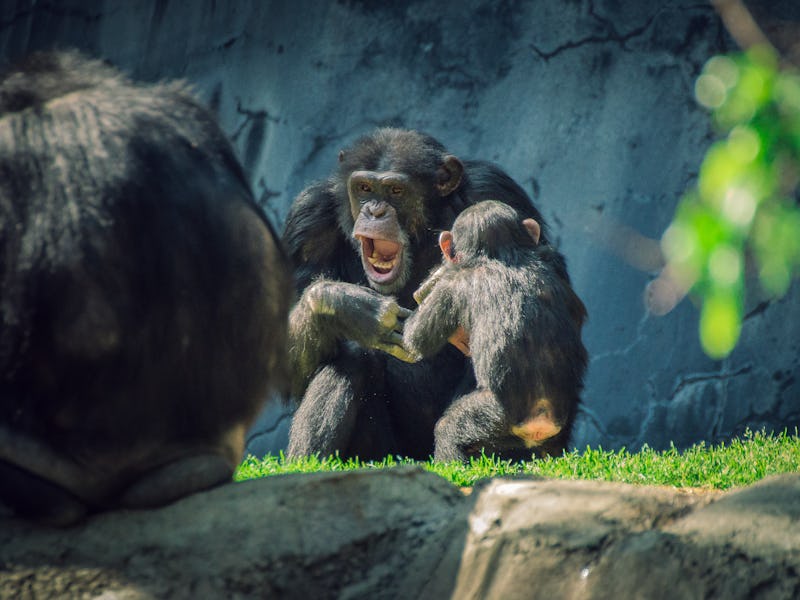In the wild, pregnant female chimpanzees have been known to take “maternity leave,” in which they leave their group to be alone for a few weeks before and after they give birth. Being so isolated is far from an ideal situation for a new mother and her infant child, but as scientists from Kyoto University reported in a paper published in early October, sometimes getting away from the group is the only way a mother can prevent her baby from being eaten alive.
Sadly, the pregnant chimp at the heart of the horrific tale the Japanese researchers tell in the American Journal of Physical Anthropology didn’t opt-in for maternity leave quickly enough, and the consequences were devastating. From their vantage point in the verdant Mahale mountains of Tanzania, the scientists witnessed a “very rare” and grisly scene that scientists had never officially documented before.
“A female chimpanzee gave birth in front of other members, and an adult male snatched and cannibalized the newborn infant immediately after birth,” they write in their paper. Suddenly, that male, named Darwin, “rushed into the dense bush” and disappeared.
About 90 minutes later, they spotted him in the boughs of a tree about 15 meters up, consuming the infant’s entire body from its lower half as some other members of the group watched. Later, some of those onlookers snatched and ate pieces of meat and bone that Darwin had dropped from his tree. He consumed the entire body within the next hour.
A chimpanzee not involved in the gruesome events sits in the boughs of a tree.
Appalling as this behavior is, it’s been observed in several different primate species before. To explain the persistence of infanticide, some scientists have used a framework called the sexual selection hypothesis, an evolutionary theory proposed by Charles Darwin that says individuals will do anything necessary to ensure their genes get passed on to the next generation.
In most cases, this involves animals fiercely competing with each other for mates. Infanticide is an extreme example of this theory in action; when a male animal kills a baby that is not his, he both forces the mother to “resume cycling quickly,” as the researchers put it, and increases his chances of getting that female pregnant with his own child. It’s a pretty brutal way of continuing your bloodline, but it is an effective one.
Chimpanzee mothers are known to take "maternity leave" to protect themselves and their young from harm.
While infanticide doesn’t always include cannibalism, the two can certainly go hand in hand, especially when resources are scarce enough that individuals begin to see each other as food. One explanation for infanticide involving cannibalism is known as the “nutritional benefit hypothesis,” which assumes that the individual doing the cannibalizing gets some nutritional value from the baby. It certainly helps make sense of Darwin and the grim meal that his fellow chimps took part in (one even licked up some of the placenta, the researchers report).
Cannibalism, on its own, is nothing new among chimps and other primates (including, unfortunately, humans). In January, researchers from Iowa State University reported in the International Journal of Primatology that they had observed a tyrannical alpha West African male chimp in Senegal that had been brutally murdered and eaten by his former victims. It was a rare, violent situation, the researchers admitted, one that was likely spurred by imbalanced numbers of males and females in the group due to illegal poaching.
Here, a group of chimps in Senegal figure out what to do with the dead tyrant's body.
The tale of Darwin in the Mahale mountains is a chilling reminder that survival is all about access to resources — and those resources can take the form of water, mates, and, yes, food in the form of other bodies. The fact that maternity leave exists among chimpanzees suggests they’re aware of this in some way and have developed strategies to protect themselves (and their offspring) against opportunistic neighbors. A likely reason chimp infanticide has never been witnessed before, the authors note, is because maternity leave is so prevalent.
Why the bereaved mother didn’t leave the group in this case remains a mystery, though the researchers say it’s possible she might have been a first-time mom who hadn’t learned about the dangers of child-rearing yet.
There seems to be no code of ethics in chimp society, but from the human perspective it’s not unfair to judge Darwin for being gross and selfish. For what it’s worth, he suffered for his deeds — the researchers note that Darwin had “severe diarrhea” after his macabre feast.
